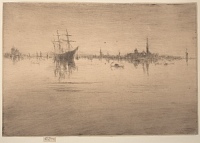Nocturne | ||
| Number: | 222 | |
| Date: | 1879/1880 | |
| Medium: | etching and drypoint | |
| Size: | 202 x 294 mm | |
| Signed: | no | |
| Inscribed: | no | |
| Set/Publication: | 'First Venice Set', 1880 | |
| No. of States: | 9 | |
| Known impressions: | 59 | |
| Catalogues: | K.184; M.181; W.150 | |
| Impressions taken from this plate (59) | ||
STATE
Nine states are known before cancellation.
State 1

There is no signature or inscription.
Before the gondolas and lines in the sky; with a faint indication of one light to left of the ship's foremast and long horizontal lines in the water, below the ship's reflection; there are many curved and diagonal scratches on the plate in addition to a remnant of etched work, which probably relates to the beginning of an abandoned subject.
The plate is executed in pure etching, with the possible exception of horizontal shading along the horizon to right of the ship's bow.
The impression illustrated has an inscription, 'no 5,' in pen and ink as well as the collector's stamp of Otto Henry Bacher (1856-1909) on the image at lower right.
State 2

With lower portions of the ship's fore- and aft masts lightly reinforced; fine drypoint shading strengthens the horizontal shading along the horizon to right of the ship's bow and creates shadows in the water to right and below the bow; fine vertical shading is added to the uppermost long horizontal line in the water below the ship's reflection.
State 3

Fine horizontal drypoint shading is added along the horizon to left and right of the ship and above the ship's deck; two small lights are clearly defined to left of the foremast.
State 4

Curved and diagonal scratches on the sky and water are removed; additions include new, fine horizontal drypoint shading along much of the horizon, including the area above San Giorgio and its campanile; horizontal and diagonal lines on the sky at upper right; horizontal and vertical drypoint shading is added to the water by the ship's and campanile's reflections and, most notably, in the foreground.
State 5

Two large gondolas are added at lower left and four smaller gondolas in the distance, one to left of the ship and three at right, in front of San Giorgio; there is considerable new drypoint shading on and above the buildings along the horizon, on the hull of the ship and among its masts; lights now clearly appear on Santa Maria della Salute (at far left), along the horizon to the right of its dome and on the ship's deck and central mast.
State 6

The two large gondolas in the foreground are removed and replaced by horizontal drypoint lines; fine lines enlarge the aureole around the light on the ship's central mast and clearly define the light on the bow of the largest remaining gondola; the reflection of the ship's prow is lengthened; lines in the sky at upper right are less distinct.
The impression illustrated was printed with plate tone on Japanese paper; some fibres on the paper surface have been disturbed, leaving fine networks of white lines among the plate tone.
State 7

With new right-to-left diagonal drypoint shading (///) between the ship's central and aft masts; there are many diagonal scratches on the right, above and below San Giorgio and other buildings and masts on the horizon.
The white, concentric marks on the impression illustrated are called 'picking,' which results from ink being lifted from the paper due to slippage of the plate, or some other irregularity of pressure, during the printing process.
State 8

With new right-to-left diagonal drypoint shading (///) above the horizon, to right of the ship's prow; much of the fine drypoint shading throughout the composition is faint and worn, especially along the horizon line, at the ship's bowsprit, on the sky at upper right and on the water in the foreground; the left-most gondola is faint; diagonal scratches at right are removed or worn away.
State 9

Fine right-to-left diagonals are added on the hull of the ship and at right, across San Giorgio and the central part of its reflection.
Shading along the horizon line, which is quite fresh on the impression illustrated, is less distinct on most other impressions; the curved scratches in the centre foreground on the illustrated impression are not visible on most examples of this state.
In late impressions of this state, as in the impression reproduced below, drypoint lines have worn away, eliminating lights by Santa Maria della Salute, along the horizon, on the steamer and on the largest remaining gondola; fine shading on the sky, along the horizon and on the water has also worn away; most drypoint shading on the ship and above its deck is gone; the left-most gondola has disappeared almost completely, and the three remaining gondolas vary in clarity depending on the inking and wiping of the plate.

Kennedy catalogued impressions with drypoint worn away as a separate state, 6 but progressive wear is visible on the final state impressions located, so it seems clear that it was allowed to fade away and was not consciously removed. Late impressions of the ninth state do present a more abstract composition; the etched forms of ships and buildings remain, while details - formerly executed in drypoint - -appear to have dissolved in nocturnal mist.
6: Kennedy 1910 (cat. no. 184).

